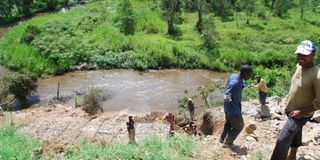River Rwizi gets Shs2.2b restoration boost

Locals build a bridge on River Rwizi. The river is currently drying up and the water levels gradually dropping thus turning into a shallow stream which can even be crossed on foot. PHOTO | COLLEB MUGUME | FILE
What you need to know:
- The country director of World Wide Fund (WWF), which is working with the government to implement the project, Mr David Duli, cautions against evicting encroachers from river banks, catchment areas, wetlands , forests, among others without providing alternative sources of livelihood.
Efforts to restore River Rwizi in Ankole Sub-region has got a Shs2.2 billion boost.
River Rwizi has been heavily degraded by human encroachment and pollution.
The chairperson of River Rwizi catchment committee, Mr Tumusiime Bamuturaki, says the funds will be used in sensitisation and creation of other livelihood activities that do not degrade the river .
“We are going to work with stakeholders to sensitise the communities to get out of the wetlands but also engage in livelihood support like farming and starting up other income-generating projects,” he says.
The presidential advisor on wetlands, Mr Ignatius Byaruhanga, says there is need to have special courts to try those who abuse the environment.
“We arrest encroachers, they are taken to court but spend a long time without trial and at times local governments lose interest and they are released. If we get special courts, these will be arrested and tried from there and then,” he says.
The director of natural resources at the Ministry of Water and Environment, Dr Florence Grace Adongo, says such interventions will save the environment.
Mr Onapito Ekomoloit, the director of corporate affairs at Nile Breweries, the company that provided the money for the river conservation project, says: “Water and our business are inseparable, when we came here in 2013, some people were saying we are going to destroy the river but we are happy since the river continues to live and all this money we are investing is to see to it that this river lives.”
Ms Adongo urges more manufacturing industries to invest in sustaining natural resources.
“Most of the manufacturers and other business communities are agro-based and directly or indirectly depend on water and if this natural resource is no more then, they will be out of business,” she says. Ms Adongo adds that the government is in the process of establishing a special environment protection force separate from police to facilitate its enforcement arm.
The country director of World Wide Fund (WWF), which is working with the government to implement the project, Mr David Duli, cautions against evicting encroachers from river banks, catchment areas, wetlands , forests, among others without providing alternative sources of livelihood.
WWF has provided Shs12 million revolving fund to communities around River Rwizi
“The revolving fund will help communities engage in livelihood projects like farming outside the catchment area and doing business,” he says.
River Rwizi which stretches from Buhweju District, serves districts of Rakai, Lyantonde, Isingiro, Lwengo, Kiruhura, Mbarara, Bushenyi, Buhweju, Rwampara, Kyotera, Sheema and Ntungamo.
The river is threatened with extinction as water levels continue to drastically reduce due to encroachment on the river catchment areas through a host human activity which include farming, sand mining, brick making and constructions.




